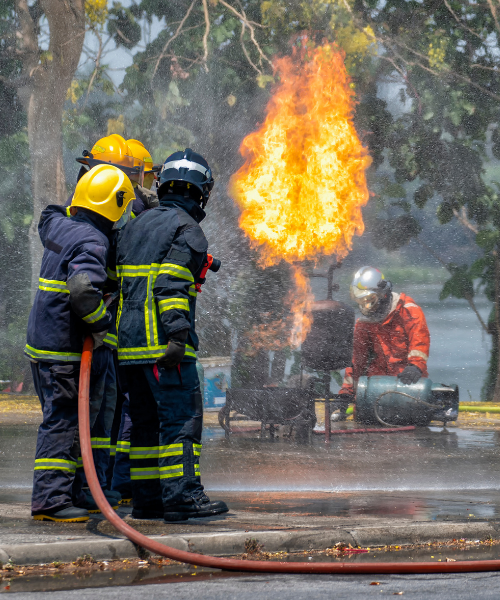Basic Fire Safety
Curriculum Description
A Basic Fire Safety course is designed to provide participants with an understanding of the fundamental principles of fire safety. The course typically covers topics such as the chemistry of fire, fire prevention and risk assessment, fire detection and alarm systems, emergency response and evacuation procedures, and the roles and responsibilities of key personnel in fire safety management. The course may also include practical exercises, such as the use of fire extinguishers, to help participants gain hands-on experience in dealing with fire emergencies. The goal of the course is to equip participants with the knowledge and skills needed to prevent fires from occurring and to respond effectively in the event of a fire emergency.
Suitable Participant
Basic Fire Safety course is suitable for anyone who wants to learn about fire safety. It is particularly relevant for those who have responsibilities for safety management. The course may also be useful for individuals who want to gain a basic understanding of fire safety. For example:
- Employees in industrial, commercial, and residential settings
- Managers in industrial, commercial, and residential settings
- Fire wardens
- Health and safety officers
- Facility managers
- Building owners
- Homeowners
- Tenants
Curriculum Outline
- Introduction to Fire Safety
- Fire Prevention and Risk Assessment
- Fire Detection and Alarm Systems
- Emergency Response and Evacuation Procedures
- Roles and Responsibilities
- Practical Exercises
- Assessments
Curriculum Duration
This course is designed to be completed over the course of 1 day, consisting of x hours.
Course Outcome:
Understand Basic Fire Science, Fire
Development Growth and principles
of rescue
Define basic rescue priority and
initiate basic rescue planning
Understand class of Fire and
principal method of Fire
Extinguishment
Demonstrate different rescue
operation technique (non-improvised
and improvised) such as using rescue
rope.
Demonstrate initial Firefighting
response using first aid firefighting
equipment such as Portable Fire
Extinguisher, Fire Hose Reel and Fire
Blanket
Demonstrate basic rescue technique
(non-improvised and improvised)
such as using foldable stretcher,
utilizing blanket, stretcher-based
rescue method and snatch rescue.

Basic Fire Safety
Curriculum Description
A Basic Fire Safety course is designed to provide participants with an understanding of the fundamental principles of fire safety. The course typically covers topics such as the chemistry of fire, fire prevention and risk assessment, fire detection and alarm systems, emergency response and evacuation procedures, and the roles and responsibilities of key personnel in fire safety management. The course may also include practical exercises, such as the use of fire extinguishers, to help participants gain hands-on experience in dealing with fire emergencies. The goal of the course is to equip participants with the knowledge and skills needed to prevent fires from occurring and to respond effectively in the event of a fire emergency.
Target Group
Basic Fire Safety course is suitable for anyone who wants to learn about fire safety. It is particularly relevant for those who have responsibilities for safety management. The course may also be useful for individuals who want to gain a basic understanding of fire safety. For example:
- Employees in industrial, commercial, and residential settings
- Managers in industrial, commercial, and residential settings
- Fire wardens
- Health and safety officers
- Facility managers
- Building owners
- Homeowners
- Tenants
Course Outline
- Introduction to Fire Safety
- Fire Prevention and Risk Assessment
- Fire Detection and Alarm Systems
- Emergency Response and Evacuation Procedures
- Roles and Responsibilities
- Practical Exercises
- Assessments
Course Duration
This fire safety course is designed to be completed over the course of 1 days, with each day consisting of x hours.

Understand Basic Fire Science, Fire
Development Growth and principles
of rescue
Define basic rescue priority and
initiate basic rescue planning
Understand class of Fire and
principal method of Fire
Extinguishment
Demonstrate different rescue
operation technique (non-improvised
and improvised) such as using rescue
rope.
Demonstrate initial Firefighting
response using first aid firefighting
equipment such as Portable Fire
Extinguisher, Fire Hose Reel and Fire
Blanket
Demonstrate basic rescue technique
(non-improvised and improvised)
such as using foldable stretcher,
utilizing blanket, stretcher-based
rescue method and snatch rescue.